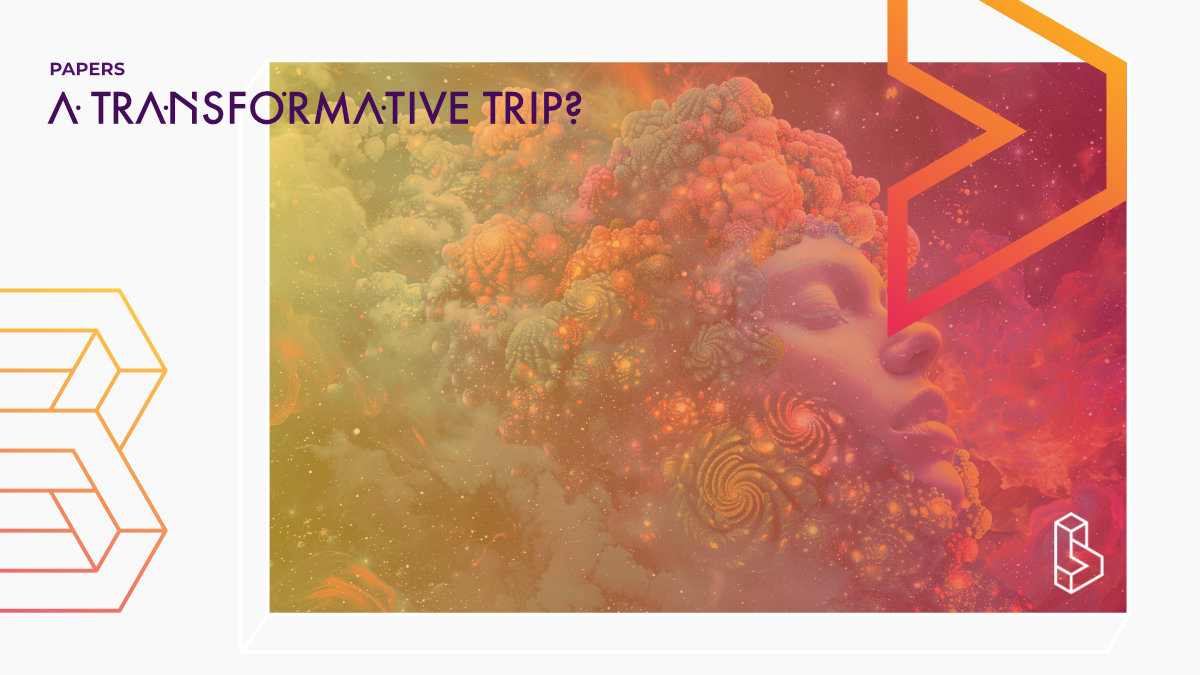This study (n=26) empirically examines whether psychedelic experiences constitute transformative experiences. Results indicate that psychedelics can lead to significant changes in identity, values, beliefs, desires, and behavior, with 20 participants reporting unique insights and the majority experiencing behavioural changes. Participants felt informed and capable in their decision to use psychedelics, and many reported an enhanced ability to enact changes in their lives. The study also highlights the importance of subjective embodiment and transformative agency while discussing neuroethical considerations related to consent and moral psychopharmacology.
Abstract of A Transformative Trip? Experiences of Psychedelic Use
“Psychedelic experiences are often compared to “transformative experiences” due to their potential to change how people think and behave. This study empirically examines whether psychedelic experiences constitute transformative experiences. Given psychedelics’ prospective applications as treatments for mental health disorders, this study also explores neuroethical issues raised by the possibility of biomedically directed transformation—namely, consent and moral psychopharmacology. To achieve these aims, we used both inductive and deductive coding techniques to analyze transcripts from interviews with 26 participants in psychedelic retreats. Results indicate that psychedelic experiences can constitute transformative experiences. Twenty participants reported experiences or insights that were seemingly inaccessible or impossible to attain if not for the psychoactive effects of psychedelics. All participants besides one reported some change in identity, values, beliefs, desires, and behavior—changes in behavior being the most common. Participants also reported feeling capable deciding to use psychedelics in part due to information seeking prior to their retreats. Finally, several participants reported an enhanced capacity for enacting changes in their lives. Our results underscore both the importance of subjective embodiment to transformation and the role of transformative agency in shaping outcomes of the psychedelic experience. We examine our results relative to neuroethical issues and advocate for centering the person in psychedelic research and neuroethical inquiry about psychedelics to avoid pitfalls associated with psychedelics’ potential as moral psychopharmacological agents.”
Authors: Logan Neitzke-Spruill, Caroline Beit, Jill Robinson, Kai Blevins, Joel Reynolds, Nicholas G. Evans & Amy L. McGuire
Summary of A Transformative Trip? Experiences of Psychedelic Use
Psychedelics have gained significant attention over the last decade due to their potential as novel therapeutics for depression, post-traumatic stress disorder, anxiety, and problematic substance use. This paper empirically examines whether psychedelic experiences constitute “transformative experiences”.
L.A Paul’s (2014) Transformative Experience explored how knowing transforms us. Paul distinguished between epistemic transformations, which stem from new types of experience that bestow novel understanding or information, and personal transformations, which stem from substantial changes to one’s core preferences or how one experiences being oneself.
Paul’s framework for rational decision making is affected by personally transformative experiences. For instance, one cannot rationally choose to become a parent because one’s core preferences, values, behaviors, and a host of other aspects of oneself change.
Find this paper
A Transformative Trip? Experiences of Psychedelic Use
https://doi.org/10.1007/s12152-024-09567-0
Open Access | Google Scholar | Backup | 🕊
Cite this paper (APA)
Neitzke-Spruill, L., Beit, C., Robinson, J., Blevins, K., Reynolds, J., Evans, N. G., & McGuire, A. L. (2024). A Transformative Trip? Experiences of Psychedelic Use. Neuroethics, 17(2), 33.
Study details
Topics studied
Equity and Ethics
Healthy Subjects
Neuroscience
Personality
Public Health, Prevention & Behaviour Change
Relationships
Safety
Study characteristics
Interviews
Qualitative
Bio/Neuro
Participants
26
Humans

